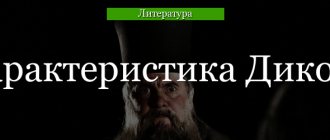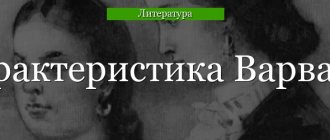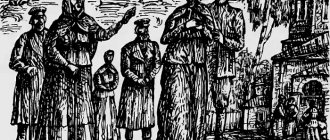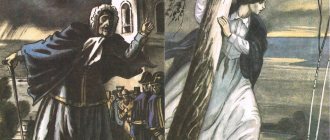- Essays
- On literature
- Ostrovsky
- Wild and Kabanikha in the play The Thunderstorm
One of the main characters of the work are representatives of the dark kingdom of Dikaya and Kabanikha, the creators and masters of the world of tyranny.
Savel Prokofievich Dikoy, a middle-aged, wealthy merchant who keeps the entire city in fear, is engaged in issuing money at extortionate interest rates and deceiving ordinary people. The characteristic features of the Wild are rudeness, cruelty and unceremoniousness, which are legendary among the local residents. The Wild One’s life principle is self-affirmation through humiliation and insult of ordinary people who are afraid of the merchant and cannot answer him in kind. Feeling her impunity, Dikoy only increases the degree of cruelty towards others. However, the merchant mocks only in front of familiar people who are not able to give him a worthy rebuff, and when he meets a stronger-in-spirit person, he immediately retreats.
The speech of the tyrant merchant is filled with rude words and abusive expressions, illustrating his superiority over other people and the feeling of complete impunity.
Kabanova Marfa Ignatievna represents a strong and powerful nature, being a rich merchant's wife, an exponent of the fundamental ideas of the dark world of tyranny, which consists in the complete obedience of all the poor. Killing the will of her household, she, using Jesuitical sophistication, humiliates their human dignity, suppressing any opportunity for resistance and disobedience.
Both heroes express a negative attitude towards any changes in their lives and advocate for the preservation of old Domostroevsky traditions. Dikoy and Kabanikha are devout and religious people, but they forget that faith should be in the heart of a person, and not in daily visits to church temples and the manifestation of pagan superstition, when Dikoy perceives a natural phenomenon in the form of a thunderstorm as heavenly punishment, retribution.
Between themselves, Kabanikha and Dikoy behave like good friends who are on friendly terms; Kabanikha Dikoy is afraid of being rude and rude, because she understands the strength of character of her godfather. Therefore, in her presence he behaves calmly and peacefully.
The actions that characterize the heroes express the main features of the tyranny of the merchants. Dikoy manifests itself in aggressive rudeness and straightforwardness, capable of unjustified violence towards others, while Kabanikha, blindly worshiping long-standing traditions and superstitions, forces her family to carry out her whims and stupid orders. Having decided that they are the mentors in the city, Dikoy and Kabanikha establish their own unspoken rules, which are unbearable to those around them and the consequence of which is the suicide of people or continuous drunkenness. But tyrants are confident that they are right and consider themselves the ultimate truth.
Revealing the images of despotic representatives of tyranny, the writer debunks the vulgarity and baseness of human actions, who do not want to see anyone or anything around them except their loved ones. These people do not know the concepts of love, honor, compassion, mutual respect, they are mired in their ignorance and do not want to change their lives, but a protest against the existing order of the Wild and Kabanikha is already brewing in society in the form of a ray in the dark kingdom.
Comparative characteristics of Wild and Kabanikha
In the drama A.N. Ostrovsky's "The Thunderstorm" has two negative characters - Marfa Ignatievna Kabanova and Savel Prokofievich Dikoy, living according to the old way of life.
Their attitude towards others can be called despotic, they love power and this is the main thing for them.
Dikoy is constantly angry with his family, and forced his nephew Boris to serve, threatening to leave him without his grandmother’s inheritance. Tikhon and Varvara, Kabanikha’s children, live in constant fear, afraid of angering their mother. She also dislikes her daughter-in-law and despises her. Martha and Savel do not allow their loved ones to live calmly and carefree.
They are used to being at the center of events. The feeling of power and permissiveness does not leave them either at home or in the city. Their actions go unpunished, because no one can dare to say a word against them. Dikoy sees worms in those around him and can destroy them at any moment.
Another common feature of the characters is a passion for material wealth. They don’t want to part with their money, so they don’t pay their honestly earned money to the peasants.
Their lifestyle is similar, they are both tyrants, without any high moral principles and respect for people.
The wild one doesn’t care about people’s opinions, he doesn’t try to hide anything. Open to everyone, even the mayor is not an authority for him. Kabanikha hides her true face behind the mask of a decent and sympathetic woman. It is very important to her what people say, so she tries to be good for everyone, showing herself exclusively from the best side. And she tries to remain silent about what is happening within the walls of her house.
Marfa Ignatievna, as a person, is not particularly educated or smart, but she loves to teach everyone and give advice, putting herself above others. Believes that he is right in any situation. A woman is incapable of admitting her mistakes, much less apologizing to anyone.
Savel Prokofievich can see and admit his own mistakes. It will not be difficult for him to ask for forgiveness from a loved one or an ordinary peasant. He does not hide the tense situation in his home, he is not afraid of anyone or anything. Being an egoist, Dikoy lives only for himself. He believes in his permissiveness and feels like the master of life.
Savel's rudeness and ignorance seem not so terrible against the backdrop of Kabanikha's meanness and despotism. She is not able to contain anger and malice, so she constantly splashes it out on her children; she has no maternal feelings. As a result, her son grows up to be a spineless young man, her daughter decides to escape, and her daughter-in-law takes her own life.
Dikoy and Kabanikha - the main features of tyranny (Based on the play “The Thunderstorm” by A. N. Ostrovsky)
Having written “The Thunderstorm,” A. N. Ostrovsky, as it were, included himself in the ranks of such writers as N. V. Gogol and M. Yu. Lermontov.
He created another one, his own model of a city where a traditional way of life reigns. But unlike Gogol’s city, Kalinov is shown ambiguously by Ostrovsky. On the one hand, beautiful nature (“The view is extraordinary! Beauty! The soul rejoices”), and on the other, the callousness of people, the ignorance that reigns in the city, anger, and so on. All residents of this city can be divided into two groups: despots and those who obey them. The two most influential people in the city can easily be considered despots The names of these people say a lot about their characters. After all, it’s not for nothing that no one (except Feklushi) calls Dikiy Savel Prokofievich, and Kabanikha – Marfa Ignatievna. Both Dikoya and Kabanikha feel like full-fledged masters in the city. Everyone obeys them: some willingly (“It’s better to endure”), others not, but all their protests are expressed only in words (“We don’t have enough guys to take my stand, otherwise we’d teach him to stop being naughty”). And that is why they do what they want, and no one dares to object to them. The main feature that unites these merchants is the love of money. All relationships between people, in their opinion, are built on wealth. Kabanikha is richer than Dikoy, and therefore she is the only person in the city with whom Dikoy must be polite. (“Well, don’t be too loose-lipped! Find me cheaper! And I’m dear to you!”) Another feature that unites them is religiosity. But they perceive God not as someone who forgives, but as someone who can only punish. But to better understand these characters, let's look at each one individually. Savel Prokofievich Dikoy is a greedy and very rude person. He can be compared to Gogol's Plyushkin. He also bargains for literally every penny. (“...What are you going to tell me to do with myself when my heart is like this! After all, I already know that I have to give, but I can’t give everything good. You are my friend, and I must give to you, but come and ask me - I’ll curse you.”) Dikoy does everything in his power to save more money. (“I’ll underpay them by just a penny per person, but this makes up thousands for me.”) But his main drawback is that he considers himself the same as everyone else. (“Well, what is it? Who doesn’t feel sorry for their own goods?”) Dikoy is very calculating. He will never allow himself to be rude to someone who is stronger and more powerful than him (“... you’ve been fighting with women all your life”). This is also evidenced by the story with the hussar (Dikoy silently listened to how he was scolded and did not object). Kabanikha’s character is a little different. It was formulated quite clearly by Kudryash; to Shapkin’s statement “Kabanikha is good too,” he replies: “Well, at least she, at least, is all under the guise of piety”... Kabanova, like no one else, reflects this city’s entire commitment to old traditions. (She teaches Katerina, Tikhon and others how to live in general and how to behave in a particular case.) Kabanova tries to seem like a kind, sensitive, sincere, and most importantly, unhappy woman. He tries to justify his actions by his age: “Mother is old and stupid; Well, you, young people, smart ones, shouldn’t exact it from us fools.” But this statement looks more like irony than sincere recognition. Kabanova considers herself the center of the universe; she cannot imagine what will happen to the whole world after her death. In his work, Ostrovsky showed a city whose inhabitants are ignorant (they do not want to read books or learn anything, but are happy to listen to wanderers who have never been anywhere themselves). Such concepts as love, friendship, mutual assistance are alien to them. (“I’ll spend it, and it won’t cost him a penny.”) But this world is not so serene. Katerina's protest, that is, her suicide, shakes their settled, quiet life. And Katerina’s death is not accidental, because she was the only “ray of light in the dark kingdom.”
Dikoya and Kabanikha - “Tyrocrats of Russian Life”
A. N. Ostrovsky, in the play “The Thunderstorm,” which he wrote in 1859, showed the life and customs of Russian provincial society of that time. He revealed the problems of morality and the shortcomings of this society, which we will try to consider by showing the main features of the tyranny of some of the characters in the play. In this case, it makes sense to take two of the most prominent representatives of society during Ostrovsky’s time - Dikiy and Kabanikha. By examining these characters separately and comparing them, we will be able to identify the main features of tyranny and also some vices and shortcomings.
Very often, the character of a hero can be clearly reflected in the reactions of others to his behavior and in remarks relating to him. This is what happened in this case. Residents of Kalinov talk about Dikiy and Kabanikha very often, and this makes it possible to obtain rich material about them. In a conversation with Kudryash, Shapkin calls Dikiy “a scolder,” while Kudryash calls him (Dikiy) a “shrill man.” Kabanikha calls Diky a “warrior.” All this speaks of the grumpiness and nervousness of his character, because Shapkin and Kudryash scold him among themselves for a reason, seeing how Dikoy scolds Boris. Reviews about Kabanikha are also not very flattering. Kuligin calls her a “hypocrite” and says that she “gives money to the poor, but completely eats up her family.” This characterizes the merchant's wife from the bad side. A more complete, in my opinion, idea of a person can be given by his speech, that is, by habitual and specific expressions inherent only to a given hero. We can see how Dikoy, as if nothing had happened, could just offend a person. He says to Boris: “Get lost!” I don’t even want to talk to you, the Jesuit.” From this phrase of his we see that he is illiterate (he speaks “with a Jesuit” instead of “with a Jesuit”), so he also accompanies his speech with spitting, which finally shows his lack of culture. In general, throughout the entire play we see him peppering his speech with abuse (“Why are you still here! Why the hell is there a merman!”), which shows him to be an extremely rude and ill-mannered person. Take, for example, when one evening he went to Kabanikha’s house and shouted at her... Kabanikha, in her speech, tries to pretend to be kind and affectionate, although sometimes it is her speech that reveals negative traits of her character, for example, a passion for money. Sometimes the merchant’s wife gets into a pose: “Well, don’t let your throat loose!” — addresses Dikiy.
The actions that characterize the tyranny of the Wild and Kabanikha are of particular interest. Dikoy is rude and straightforward in his aggressiveness; he commits actions that sometimes cause bewilderment and surprise among others. He is capable of offending and beating a man without giving him money, and then in front of everyone standing in the dirt in front of him, asking for forgiveness. He is a brawler, and in his violence he is capable of throwing thunder and lightning at his household, who are hiding from him in fear.
Kabanikha is absurdly blindly devoted to her old traditions, forcing everyone at home to dance to her tune. She forces Tikhon to say goodbye to his wife in the old-fashioned way, causing laughter and a feeling of regret among those around him.
It remains to be noted that both Dikoy and Kabanikha are very pious and religious. Dikoy, for example, sees retribution in a thunderstorm.
So, we have examined the main features of the heroes’ tyranny. The question remains to be clarified: which of them is more terrible in his life concept and principles? On the one hand, it seems that Dikoy is ruder, stronger and, therefore, more terrible. But, taking a closer look, we see that Dikoy is only capable of screaming and rampaging. But the terrible and despotic essence of Kabanikha is revealed to us. She managed to subjugate everyone, keeps everything under control, she even tries to manage people’s relationships, which leads Katerina to death. The Pig is cunning and smart, unlike the Wild One, and this makes her more terrible.
So, all of the above, in my opinion, not only shows the main features of the tyranny of Kabanikha and Dikiy, but in general may reflect the problems and shortcomings of Russian society at that time
Information about the work “Dikaya and Kabanikha - “Tymptons of Russian Life””
Section: Literature and Russian language Number of characters with spaces: 3899 Number of tables: 0 Number of images: 0
Similar works
Russian and foreign literature. Moliere, "The Miser". A.N. Ostrovsky, “Thunderstorm”
85646
0
0
... and P.S. Mochalova. The article by V.G. Belinsky and A.I. Herzen had a great influence on the formation of the worldview of the young Ostrovsky. Already in his first works, Ostrovsky showed himself to be a follower of the “Gogolian trend” in Russian literature, a supporter of the school of critical realism. His commitment to ideological realistic art, the desire to follow the precepts of V.G. Belinsky ...
Collection of works of Russian literature from the 19th century to the 80s of the 20th century
876679
0
0
... nests", "War and Peace", "The Cherry Orchard". It is also important that the main character of the novel opens up a whole gallery of “superfluous people” in Russian literature: Pechorin, Rudin, Oblomov. Analyzing the novel “Eugene Onegin,” Belinsky pointed out that at the beginning of the 19th century, the educated nobility was the class “in which the progress of Russian society was almost exclusively expressed,” and that in “Onegin” Pushkin “decided ...
The idea of doom of the “dark kingdom” in the drama “The Thunderstorm”
5142
0
0
... the meaning of the heroine’s life. Katerina comes into conflict not only with the surrounding fed, but also with herself. This is the tragedy of the heroine’s situation. If the drama ended with a scene of repentance, it would show the invincibility of the “dark kingdom.” But the drama ends with Katerina’s moral victory both over the forces that fettered her freedom and over what fettered her will and reason. Katerina decides to commit suicide. ...
The idea of doom of the “dark kingdom” in the drama “The Thunderstorm”
4278
0
0
... the life of the heroine. Katerina comes into conflict not only with the environment, but also with herself. This is the tragedy of the heroine’s situation. If the drama ended with a scene of repentance, it would show the invincibility of the “dark kingdom.” But the drama ends with Katerina’s moral victory both over the forces that fettered her freedom, and over the dark representatives who fettered her will and reason. Katerina decides to...



